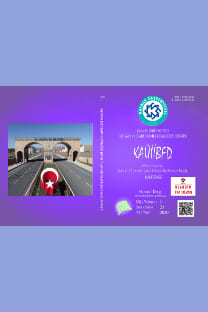SÜRDÜRÜLEBİLİRLİK İLE KURUMSAL İTİBAR ARASINDAKİ İLİŞKİDE YÖNETİM KURULU VE AİLE SAHİPLİĞİNİN DÜZENLEYİCİ ETKİSİ
Sürdürülebilirlik, kurumsal itibar, yönetim kurulu yapısı, aile sahipliği
THE SUSTAINABILITY EFFECT ON CORPORATE SUSTAINABILITY THROUGH THE MODERATOR ROLES OF BOARD COMPOSITION AND FAMILY OWNERSHIP
Sustainability, corporate reputation, board composition, family ownership,
___
- Aiken, L. S., & West, S. G. (1991). Multiple Regression: Testing and Interpreting Interactions, 1. Baskı, USA: Sage Publications.
- Alon, A., & Vidovic, M. (2015). Sustainability performance and assurance: influence on reputation. Corporate Reputation Review, 18(4), 337-352.
- Aksoy, M., Yilmaz, M. K., Tatoglu, E., & Basar, M. (2020). Antecedents of corporate sustainability performance in Turkey: The effects of ownership structure and board attributes on non-financial companies. Journal of Cleaner Production, 276, 1-11
- Amran, A., Lee, S. P., & Devi, S. S. (2014). The influence of governance structure and strategic corporate social responsibility toward sustainability reporting quality. Business Strategy and the environment, 23(4), 217-235.
- Axjonow, A., Ernstberger, J., & Pott, C. (2018). The impact of corporate social responsibility disclosure on corporate reputation: a non-professional stakeholder perspective. Journal of Business Ethics, 151(2), 429-450.
- Barney, J. B. (1991). Firm Resources and Sustained Competitive Advantage. Journal of Management, 17 (1), 99-120.
- Barney, J. B. (1986). Strategic factor markets: Expectations, luck, and business strategy. Management Science, 32(10), 1231-1241.
- Baysinger, B. D., Kosnik, R. D., & Turk, T. A. (1991). Effects of board and ownership structure on corporate R&D strategy. Academy of Management Journal, 34, 205–214.
- BIST (2020). Şirketler için Sürdürülebilirlik Rehberi, 1-82.
- Bord, R. J., & O'Connor, R. E. (1997). The gender gap in environmental attitudes: The case of perceived vulnerability to risk. Social science quarterly, 830-840.
- Branco, M. C., & Rodrigues, L. L. (2006). Corporate Social Responsibility and Resource-Based Perspectives. Journal of Business Ethics, 69(2), 111-132.
- Brown, P., Beekes, W., & Verhoeven, P. (2011). Corporate governance, accounting and finance: a review. Accounting and Finance, 51(1), 96-172.
- Burke, R. J. (1997). Women directors: selection, acceptance and benefits of board membership. Corporate Governance: An International Review, 5, 118–125.
- ISSN: 1309-4289
- Yayın Aralığı: Yılda 2 Sayı
- Başlangıç: 2010
- Yayıncı: Kafkas Üniversitesi, İktisadi ve İdari Bilimler Fakültesi
SOSYAL ZEKÂNIN KARAR VERME STİLİNE OLAN ETKİSİNDE BİLİŞSEL ESNEKLİĞİN DÜZENLEYİCİ ROLÜ
Almula Umay KARAMANLIOĞLU, H. Nejat BASIM
THE ROLE OF SOCIAL NETWORKS IN FOREIGN DIRECT INVESTMENTS: THE CASE OF TURKISH BUSINESS GROUPS
Elif SİS ATABAY, Tuğba KAPLAN, Kader ŞAHİN
YABANCI EL SENDROMU MU ÇİFT YÖNLÜLÜK MÜ? START-UPLAR ÜZERİNE ÇOKLU ÖRNEK OLAY ÇALIŞMASI
Handan Deniz BÖYÜKASLAN, Belkıs ÖZKARA
BİLİNÇLİ FARKINDALIĞIN BİLİŞSEL KAYIPLAR ÜZERİNDEKİ ETKİSİ: ÖZNEL İYİ OLUŞUN ARACILIK ROLÜ
Hande ÜNÜVAR, Sema POLATCI, Hüseyin YILMAZ
SOSYOTROPİK-OTONOM KİŞİLİK ÖZELLİKLERİNİN BİLGİ İFŞASINA ETKİSİNDE ETİK İŞ İKLİMİ ALGISININ ROLÜ
FARKLILIKLARIN ETKİLEŞİMİNDEN KAYNAKLANAN“KENAR ETKİSİNİN” ÖRGÜTSEL YENİLİKÇİLİĞE KATKISI
A RESEARCH ON THE EFFECT OF INDIVIDUAL VALUES ON SELF-LEADERSHIP BEHAVIOR
